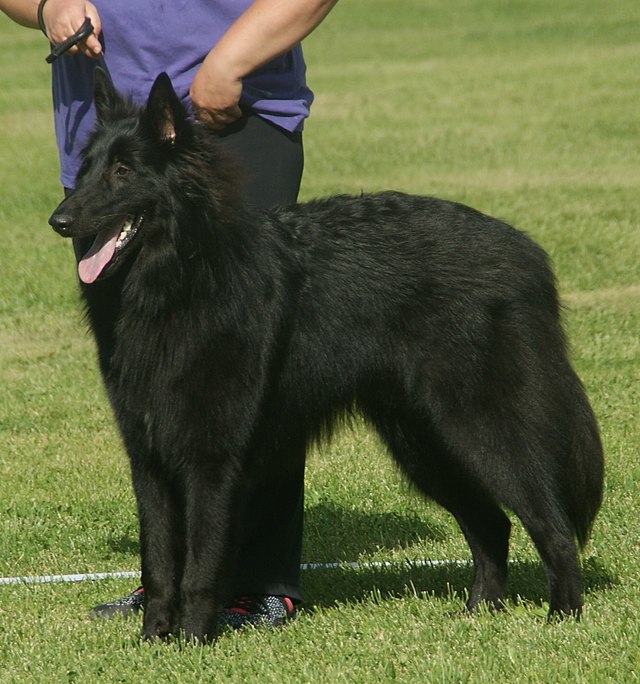


The Belgian Sheepdog, also known as the Belgian Groenendael, is a highly intelligent and versatile working dog. This breed is known for its herding abilities, loyalty, and strong bond with its family. Belgian Sheepdogs are medium-sized, with a graceful, athletic build and a long, dense black coat. These dogs excel in various canine sports, including obedience, agility, and search-and-rescue work. They are well-suited for active families and individuals who can provide them with mental stimulation and physical exercise.
The Belgian Sheepdog originated in Belgium, where it was developed as a herding and farm dog. It is one of four Belgian Shepherd breeds, the others being the Belgian Malinois, Belgian Laekenois, and Belgian Tervuren. The Belgian Sheepdog was specifically bred for its herding instincts, with a focus on guarding livestock and performing other farm-related tasks. The breed was officially recognized in Belgium in the late 1800s. The Belgian Sheepdog became well-known worldwide after being used during both World Wars as a messenger and guard dog. It continues to be a versatile working dog today, as well as a popular companion and show dog.
The Belgian Sheepdog is a medium-sized dog, typically standing 24 to 26 inches (61 to 66 cm) tall at the shoulder and weighing between 60 to 75 pounds (27 to 34 kg). The breed has a long, straight, dense coat that is typically black, though some variations may show a hint of gray or other subtle colorings. The coat requires regular grooming to maintain its appearance and prevent matting. The Belgian Sheepdog has a square, athletic build, with a well-proportioned head and sharp, alert eyes. Its tail is bushy, and it carries it in a gentle curve. The breed’s long coat and proud stance make it easily recognizable, and its overall appearance reflects its strength, agility, and intelligence.
The Belgian Sheepdog is known for being highly intelligent, alert, and loyal to its family. It is a devoted companion, often forming a strong bond with its owner and family members. This breed is protective and can be reserved or wary around strangers, making it an excellent watchdog. While the Belgian Sheepdog is generally good with children, it can be reserved with other pets, especially if not socialized early. Its herding instincts can also lead to a tendency to herd children or other animals. The breed thrives on mental stimulation and can become bored or anxious without enough activity or engagement. A confident, consistent owner is ideal for this breed, as it responds well to training and guidance.
The Belgian Sheepdog is an active and energetic breed that requires plenty of exercise to stay healthy and happy. Due to its herding background, it has a high level of stamina and enjoys physical activities such as running, hiking, and playing. Regular exercise is essential to prevent boredom and destructive behavior. This breed also excels in dog sports like agility, obedience, and herding trials. If not provided with enough physical activity, the Belgian Sheepdog can become anxious and may resort to unwanted behaviors. A securely fenced yard is ideal for this breed, as it allows them to run and explore safely. Mental stimulation is equally important, and puzzle toys, scent games, and obedience training can help keep the Belgian Sheepdog engaged.
The Belgian Sheepdog is highly trainable due to its intelligence and eagerness to please. However, it can be independent and strong-willed at times, requiring a firm and consistent trainer. Early socialization is crucial to help the breed become well-rounded and comfortable around other dogs, animals, and unfamiliar people. Belgian Sheepdogs that are properly socialized tend to be more confident and balanced in their interactions. Positive reinforcement techniques work well with this breed, as they respond to rewards and praise. Given their high energy levels and desire to please, Belgian Sheepdogs excel in obedience training and often thrive in canine sports and activities that challenge their intellect and agility.
The Belgian Sheepdog is generally a healthy breed, but like all dogs, it can be prone to certain health conditions. Some common issues include hip dysplasia, elbow dysplasia, and various eye conditions, such as progressive retinal atrophy (PRA). Regular veterinary check-ups and a balanced diet can help maintain the breed's overall health. Belgian Sheepdogs are also susceptible to certain genetic conditions, so responsible breeding practices are important. Grooming is an essential part of caring for a Belgian Sheepdog, as its long, thick coat requires regular brushing to prevent matting and tangling. Additionally, the breed’s ears should be checked regularly for signs of infection, and its nails should be kept trimmed.
The Belgian Sheepdog typically has a lifespan of 12 to 14 years. This longevity can be influenced by factors such as genetics, diet, exercise, and overall care. By maintaining a healthy lifestyle, including regular vet visits and proper grooming, Belgian Sheepdogs can enjoy a long and fulfilling life. As they age, it is important to monitor their joint health and make adjustments to their exercise routine to keep them comfortable.
© copyright Dog Compendium 2024 - 2026